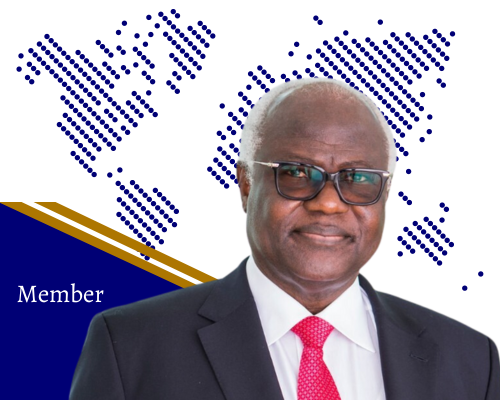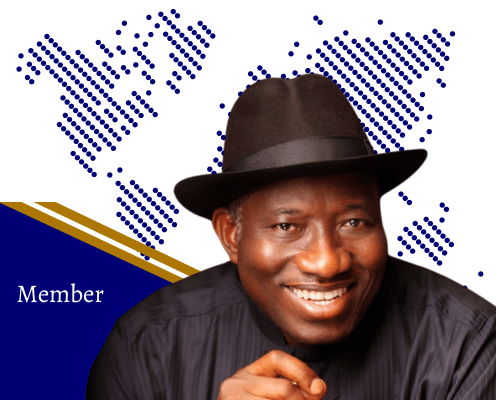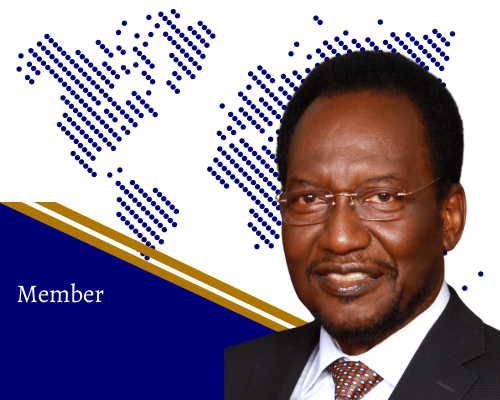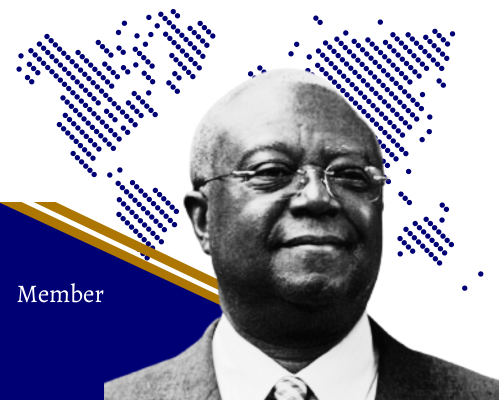Members of the West African Elders Forum (WAEF)
His Excellency Ernest Bai Koroma
President, Sierra Leone(2007 - 2018)
H.E. Dr. Ernest Bai Koroma was democratically elected president of the Republic of Sierra Leone in November 2007, after serving as opposition leader in Parliament for five years. In April 2018, President Koroma completed his second term and as the democrat he is, despite calls for him to stay on, he adhered to his constitutional term limit, conducted peaceful democratic multi-tier elections, and gracefully handed over power. His legacy includes, but not limited to the consolidation of peace, a massive rebuilding of roads, pipe-borne water, energy, education and health infrastructure. Owing to his peacebuilding and peace consolidation efforts, in 2014, the U.N. described Sierra Leone as a storehouse of lessons on post-conflict reconstruction. President Koroma was then decorated with the UN Peace Beret by then U.N. Secretary-General, Ban Ki- Moon. Not surprising that by 2018, when he was leaving office, Sierra Leone was ranked as the third most peaceful country in Africa. President Koroma chaired the AU Peace Council for three consecutive years and led the efforts to broker peace in Cote D’Ivoire, Guinea Bissau, and The Gambia. On the international stage, he chaired the African Union Committee of Ten for the Reform of The United Nations, advocating for Africa to have two permanent seats on the United Nations Security Council and more African representation at the United Nations. Since leaving Office in 2018, Former President Koroma has dedicated his post-presidency advocating for issues that are fundamental to peace, democracy, the environment, women, and youth empowerment. He has led eight Election Observation Missions to Namibia, Zambia, Togo, Benin, The Gambia, Kenya, and Nigeria under the auspices of the African Union (A.U.) and the Economic Community of West African States (ECOWAS); and one to Somaliland by invitation of the South African based Brenthurst Foundation. Frequently referred to as the Apostle of Peace he has received multiple distinguished recognitions including one by the President of Zambia, Order of the Eagle of Zambia 1st Division for the Promotion of Democracy and Good Governance. The United States Black Legislative Caucus also honoured him for his legacy in upholding Democratic Principles and Maintaining the Hard-Earned Peace in Sierra Leone. He currently serves as Chair of the Africa Drive for Democracy, a democracy advocacy initiative based in Tanzania.


His Excellency Dr. Goodluck Ebele Jonathan
President, Federal Republic of Nigeria (2011 - 2015)
Goodluck Jonathan (born November 20, 1957, Otuoke, Nigeria) is a Nigerian zoologist and politician who served as vice president (2007–10) and president (2010–15) of Nigeria. Jonathan, of the Ijaw ethnic group and a Christian, was born and raised in the region of the Niger delta in what is now Bayelsa state.
He attended Christian primary and secondary schools in the area and later attended the University of Port Harcourt, earning a B.S. in zoology (1981), an M.S. in hydrobiology and fisheries biology (1985), and a Ph.D. in zoology (1995). During his university education, he also taught at Rivers State College of Education from 1983 until 1993. He then served as an assistant director at the Oil Mineral Producing Areas Development Commission, a now defunct government agency, from 1993 until 1998. Jonathan’s political career began when he became involved with the nascent People’s Democratic Party (PDP) in the late 1990s.
He was elected deputy governor of Bayelsa state in 1999 under the party’s banner. He served in that position until 2005, when he was elevated to the governorship after the incumbent was charged with corruption and impeached. In 2007 he was selected to be the vice presidential running mate of the PDP’s presidential candidate, Umaru Musa Yar’Adua. He and Yar’Adua were elected in April and inaugurated in May.
As vice president, Jonathan engaged in efforts to negotiate with militants in the Niger delta, who were fighting against petroleum companies operating in the delta region, but otherwise he largely remained in the political background. His profile rose considerably in early 2010 when Yar’Adua’s extended absence from the country for medical treatment made many Nigerians anxious and generated calls for Yar’Adua to formally transfer power to Jonathan. As concerns mounted and there was no word from Yar’Adua on the request to transfer power to his vice president, members of Nigeria’s National Assembly took matters into their own hands and on February 9, 2010, voted to have Jonathan assume full power and serve as acting president until Yar’Adua was able to resume his duties.
Jonathan agreed and assumed power later that day, but it was unclear whether the assumption of power was constitutional. When Yar’Adua returned to Nigeria on February 24, 2010, it was announced that Jonathan would remain as acting president while Yar’Adua continued to recuperate. The next month, Jonathan asserted his power by replacing Yar’Adua’s cabinet. Yar’Adua, who never fully recovered, died on May 5, 2010, and Jonathan was sworn in as president the following day. Jonathan vowed to continue his involvement in the Niger delta peace negotiations and declared his intentions to reform the country’s oft-criticized electoral process as well as tackle corruption and deal with the country’s energy problems.
His Excellency Dioncounda Traore
Acting President, Mali (2012 - 2013)
Acting President, Mali (2012 - 2013)


His Excellency, Amos Sawyer (Late)
President, Republic of Liberia (1990 - 1994)
President, Republic of Liberia (1990 - 1994)